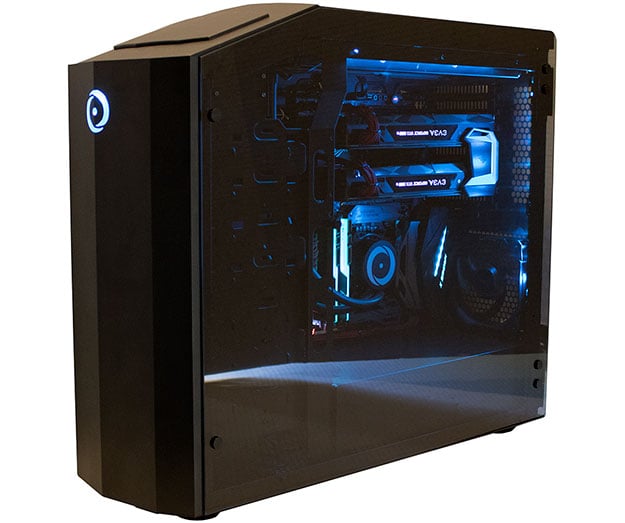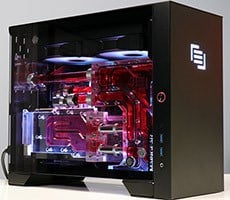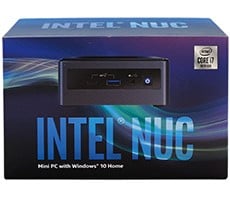Origin PC Millennium Gaming Desktop Review: Custom Chassis, Blinding Speed
Origin PC Millennium Desktop: High-End Hardware In A Custom Case
Origin PC has been making the case for buying a premium PC from a boutique builder, ever since its founders set up shop in Florida nearly a decade ago. A little more recently, Origin PC started quite literally making the case, designing a custom chassis for its Genesis (full-tower) and Millennium (mid-tower) desktops that were first introduced in 2014. We are now in 2018 (barely) and to drive home the pun, Origin PC is still making the case (get it?) for these desktop lines.
With a new year came an opportunity for Origin PC to refresh these desktops, and that is exactly what it did, both inside and out. As you might expect, the Millennium setup the company sent us is running the latest hardware, including an Intel 8th Generation (Coffee Lake) Core i7-8700K processor and two NVIDIA GeForce GTX 1080 Ti graphics cards in SLI. Nothing to scoff at, to be sure, but the most striking thing about the Millennium is the custom case that is housing all this hardware goodness.
We're not taking anything away from its hardware configuration, rather we're giving props to Origin PC for designing an enclosure that is every bit as awesome as anything else out there. Some of the unique features are the same as before, such as being able to choose from four different motherboard orientations, and a hot swap hard drive bay. But there are some nifty new bits too, like swappable side panels that swing open with ease and tool-less upgradeability, for example.
There is more to be said about the case, and we'll do that in a moment. Before we do, let's have a look at the configuration Origin PC our way.
Origin PC took the liberty of overclocking this machine and cranking the unlocked Core i7-8700K processor to 5GHz. It also boosted both the GPU clock and memory clock on each of the GeForce GTX 1080 Ti cards. Having to pay an up-charge for overclocking negates the free benefit that typically comes with overclocking, but the value lies in letting Origin PC spend time figuring out where the limit of performance lies without sacrificing stability or voiding any warranties.
Beyond overclocking, one of the trickier parts to configuring a system is balancing performance with price, and identifying the point of diminishing returns. Origin PC has done a good job of that here, for a high-end build. The 16GB of DDR4-3000 RAM might not look as impressive on paper as 32GB of DDR4-4000, but in most cases (and certainly gaming), there is little benefit in spending a premium on a bigger, faster kit. The same is true of the power supply. Unless you're building a mining PC, an 850W PSU is more than enough for a high-end build like this one.
Of course, this is not the only configuration Origin PC offers. Most of the component categories include multiple different options. Depending on your budget, you could pare this thing down and get that price closer to pedestrian level, or go bonkers and have Origin PC build a $10,000 machine.
With a new year came an opportunity for Origin PC to refresh these desktops, and that is exactly what it did, both inside and out. As you might expect, the Millennium setup the company sent us is running the latest hardware, including an Intel 8th Generation (Coffee Lake) Core i7-8700K processor and two NVIDIA GeForce GTX 1080 Ti graphics cards in SLI. Nothing to scoff at, to be sure, but the most striking thing about the Millennium is the custom case that is housing all this hardware goodness.
We're not taking anything away from its hardware configuration, rather we're giving props to Origin PC for designing an enclosure that is every bit as awesome as anything else out there. Some of the unique features are the same as before, such as being able to choose from four different motherboard orientations, and a hot swap hard drive bay. But there are some nifty new bits too, like swappable side panels that swing open with ease and tool-less upgradeability, for example.
There is more to be said about the case, and we'll do that in a moment. Before we do, let's have a look at the configuration Origin PC our way.
|
| Operating System | Windows 10 Home 64-Bit |
| Processor | Intel Core i7-8700K (6-Core/12-Thread, 12MB Cache, 3.7GHz to 4.7GHz) - overclocked to 5GHz |
| Graphics | 2 x NVIDIA GeForce GTX 1080 Ti w/ 11GB GDDR5X (SLI w/ HB Bridge) - overclocked |
| Memory | 16GB DDR4-3000 MHz (4x8GB) G.Skill Trident Z RGB |
| Optical Drive | N/A |
| Storage | 512GB Samsung 960 Pro M.2 NVMe SSD 3TB Origin Approved HDD (Seagate BarraCuda, 64MB Cache, 7,200 RPM) |
| Cooling System | Origin Frostbyte 360 Sealed Liquid Cooling System |
| Connectivity | Gigabit LAN, 802.11ac Wi-Fi, Bluetooth 4.2 |
| Front Panel Ports | 2 x USB 3.0 Type-A, USB Type-C, Headphone, Microphone |
| Rear Panel Ports | 2 x USB 3.1 Gen 2 Type-A + USB Type-C, 4 x USB 3.1 Gen 1, 2 x USB 2.0, DisplayPort, HDMI, GbE LAN, Audio Ports, Clear CMOS Button, USB BIOS Flashback Button |
| Power Supply | 850W EVGA SuperNova G3 w/ Sleeved Cables |
| Dimensions | 20 x 23 x 9 inches (HxDxW) |
| Weight | 30 Pounds |
| Warranty | 1-Year Parts, Lifetime Labor and Tech Support, 45-Day Shipping |
| Pricing | $4,369 (as configured) |
Origin PC took the liberty of overclocking this machine and cranking the unlocked Core i7-8700K processor to 5GHz. It also boosted both the GPU clock and memory clock on each of the GeForce GTX 1080 Ti cards. Having to pay an up-charge for overclocking negates the free benefit that typically comes with overclocking, but the value lies in letting Origin PC spend time figuring out where the limit of performance lies without sacrificing stability or voiding any warranties.
Beyond overclocking, one of the trickier parts to configuring a system is balancing performance with price, and identifying the point of diminishing returns. Origin PC has done a good job of that here, for a high-end build. The 16GB of DDR4-3000 RAM might not look as impressive on paper as 32GB of DDR4-4000, but in most cases (and certainly gaming), there is little benefit in spending a premium on a bigger, faster kit. The same is true of the power supply. Unless you're building a mining PC, an 850W PSU is more than enough for a high-end build like this one.
Of course, this is not the only configuration Origin PC offers. Most of the component categories include multiple different options. Depending on your budget, you could pare this thing down and get that price closer to pedestrian level, or go bonkers and have Origin PC build a $10,000 machine.








